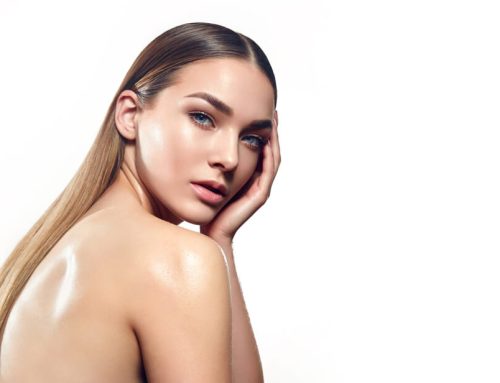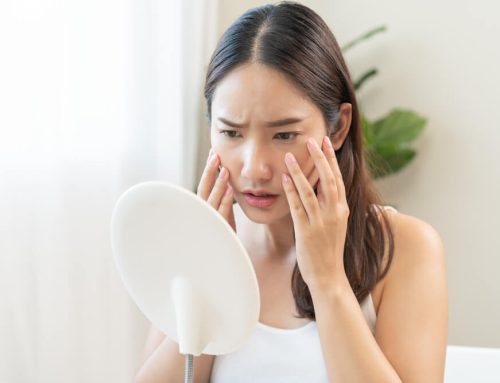While some botanicals come from the stems, leaves, seeds and roots of a plant, others come from the plant’s actual flowers themselves. Flower extracts can be incredibly potent, and can do so much good for your skin.
Want to start using some?
Here are the best flower extracts to incorporate into your skin care routine:
Chamomile

Chamomile is quite a famous flower, with this edible daisy lookalike being used throughout history as a calming aid.
Well, in addition to relaxing the body when consumed, chamomile has similar effects when applied to the skin too…
Chamomile is a fantastic skin-soother, and this is all down to the flower’s anti-inflammatory and anti-itch properties. This makes it effective at treating inflammatory skin conditions, with the extract able to tackle everything from acne to eczema.
For those who have dry or damaged skin…
Chamomile could make a huge difference. The flower extract contains flavonoids that speed up the rate at which skin cells heal themselves, while also being able to restore moisture to the skin, minimizing dryness and giving the skin back its suppleness.
Love the idea of using chamomile?
Well, you need to make sure that you get the right extract…
There are two main types of chamomile out there:
- German (Matricaria Recutita)
- Roman (Anthemis Nobilis)
When it comes to skin care, both chamomile varieties have soothing effects, but German Chamomile tends to be far superior. It contains higher levels of Chamazulene, which makes this variety even more effective at reducing inflammation and increasing skin cell regeneration.
Spilanthes Acmella

While most people will have heard of chamomile, the Spilanthes Acmella plant is much lesser-known. This medicinal plant, which is found in tropical and subtropical countries, also goes by the name of Paracress and The Toothache Plant.
Why?
Because it has the unique ability to provide numbness and relax facial tension, and therefore reduce the fine lines and wrinkles that have formed because of facial muscular movements.
That is why Spilanthes Acmella is often referred to as the natural alternative to Botox.
Studies show that when applied topically, Spilanthes Acmella flower extract has an almost instantaneous effect, even when used at low concentrations.
Other research points to the antioxidant properties that this flower extract has as well…
These properties are strong, with this botanical able to scavenge free radicals and significantly slow down the skin aging process.
Jasmine

Jasmine is a popular flower in Asia, where it is commonly used for festivals, weddings and other special occasions.
However, this fragrant flower also brings with it several skin benefits too…
Jasmine flower extract is packed with a number of active chemical compounds that have the following effects when applied topically on the skin:
- Evens out the skin tone – Jasmine helps to brighten up and even out the skin tone, reducing the appearance of age spots and discoloration
- Anti-aging – just like the other flower extracts on this list, Jasmine is also packed with potent antioxidants
- Moisturizing – this botanical is fantastic for tackling dry skin, as it helps to increase the amount of moisture that your skin can hold. It is also non-comedogenic, meaning that even those with oily skin can benefit from this extract’s moisturizing properties
Have you found that Jasmine extract irritates your sensitive skin?
Well, this all depends on the variety of Jasmine that you use. There is one variety in particular, known as Jasmine Sambac, which is native to Hawaii and is known for being especially gentle, making it suitable for all skin types.
Hibiscus

The Hibiscus flower comes in so many different shapes, sizes and colors, and just about all of them are able to benefit the skin.
One of the greatest skin benefits of Hibiscus extract is the way in which this botanical is able to inhibit the activity of elastase.
What is elastase?
It is an enzyme that is responsible for breaking down the elastin in your skin. Elastin is one of the main structural proteins in your skin, giving your skin its tightness and elasticity, making it no surprise that the skin becomes loose, saggy and wrinkled once it begins to lose its elastin.
By inhibiting the way in which the elastase enzyme works, Hibiscus is able to preserve your skin’s elasticity while also promoting the natural production of even more elastin.
The fact that Hibiscus is packed with moisture, thanks to its high content of mucilage, is another bonus when it comes to elasticity. This mucilage increases the skin’s moisture retention abilities, enabling skin cells to stay plump and hydrated. This then allows them to function to the best of their abilities.
Another unique effect that Hibiscus extract has is when it comes to cell turnover…
Your cell turnover rate refers to the rate at which your skin naturally sheds its dead skin cells, replacing them with the fresh new skin cells it has produced.
This process takes about two weeks for babies, but lengthens the older you get, which is why mature skin often takes on a dull and rough appearance.
However, Hibiscus is an ingredient that is able to speed this natural process back up…
This is all down to the organic acids within the extract, such as citric acid and malic acid. Both of these acids are already commonly used when it comes to chemical exfoliation, and Hibiscus extract can provide these same effects.
If all of that was not enough…
Hibiscus is also packed with a group of antioxidants known as anthocyanocides. Not only do these work in the same way as other antioxidants when it comes to neutralizing free radicals, but they also boast astringent and anti-inflammatory properties, meaning that they are able to soothe the skin while giving it a tighter and smoother appearance.
Lavender

The beautifully fragrant flowers of the Lavender plant are instantly recognizable, with the plant’s fragrance having long since been used for its aromatherapy effects.
While your skin will definitely benefit from the extract’s therapeutic scent, Lavender has so much more to offer, such as:
- Anti-Inflammatory Properties – Lavender is able to quickly reduce redness and swelling, while also preventing scarring
- Antibacterial – the antibacterial properties of Lavender make it effective at treating certain skin conditions, such as acne and eczema
- Balances Sebum Production – this effect is especially helpful for those with oily, acne-prone skin, as Lavender is able to stop your skin from over-producing oil
- Purifying – Lavender also boasts purifying and cleansing properties, which is why you will often find it incorporated into cleansers and face masks
When it comes to choosing a lavender-infused product…
You will likely see two types of this botanical available:
- Lavender Extract
- Lavender Oil
Both of these come from the flowers of the Lavender plant. The main difference between the two is that the oil tends to be more concentrated, and also features a stronger scent. However, when it comes to the plant’s skin benefits, both the oil and the extract have very similar effects.
Calendula / Marigold

Officially known as Calendula Officinalis, Calendula extract is another popular skin care ingredient.
Why?
Because it has such powerful restorative properties. It promotes cell and tissue regeneration, meaning that it is able to revitalize and renew the complexion.
For those concerned about skin aging, Calendula is a flower extract definitely worth adding in to your skin care arsenal…
Not only will this extract increase your skin’s natural production of collagen, resulting in a smoother and firmer complexion, but it also tackles dryness, which is something that becomes more common with age.
Plus, the antioxidant properties of Calendula extract help with this too by fighting the free radicals that accelerate the aging process.
Wondering whether to use Calendula during the day or at night?
Both would be extremely beneficial. While Calendula does contain the components required by your skin cell to regenerate themselves overnight, it is also known for being able to protect the skin from UV rays, meaning that it can increase the efficiency of your sunscreen when used during the day.
Rose

You have likely already spotted rose extracts in a number of different skin care products, and this is because this botanical is a fantastic source of so many nutrients.
It is the petals of the plant that tend to be used when creating extracts, as well as Rose essential oil. However, you may also come across rosehip extract, which is another extremely popular botanical derived from roses, and this comes from the fruit that is left on the plant once the flower has died. Although the oils and extracts come from different rose varieties than rosehip oil, all of these botanical ingredients still bring with them similar benefits.
Whichever you decide to go for, roses have fantastic purifying and cleansing properties. They are able to refresh the skin, clearing away any excess sebum and irritants, while also naturally balancing out the skin’s pH level. This is why you will find rose extracts in so many facial toners. The astringent effect that roses have help with this too, as the extract is able to tighten up the skin and keep it looking fresh.
Rose extract also contains many natural oils, and, when applied onto the skin, these oils are able to trap moisture into your skin cells, immediately hydrating them and plumping them up.
Let’s not forget about the vitamin C content in rose extracts either…
Vitamin C is required by your skin for so many different processes, which is why the ingredient is such a popular anti-ager.
Not only does vitamin C help to increase your skin’s production of collagen and elastin, giving you a smoother and tighter complexion, but it also brightens the complexion, strengthens up the skin cells, and helps to protect the skin from sun damage.
To make it even better, the scent that roses have is completely unparalleled. When rose extracts are used in skin care formulations, this often means that those products do not need to contain any artificial fragrances, as the rose extract often provides the product with enough of a floral scent.
Lotus

The Lotus is another flower that is revered by many cultures around the world, with this bloom being the national flower for Vietnam and India. This is a plant that grows in rivers and ponds, with the flowers emerging from above the surface of the water.
While this edible flower is often consumed as a tea, it has numerous skin benefits when applied topically too, such as:
- Packed with vitamins and minerals – Lotus extract is a fantastic source of several nutrients, including the B complex vitamins, vitamin C, vitamin A and various minerals
- Anti-aging – as mentioned above, Lotus extract contains vitamin A, which is one of the top anti-aging vitamins out there. It speeds up cell turnover, reduces the appearance of fine lines and wrinkles, and increases the lifespan of skin cells. Lotus extract is also high in antioxidants and polyphenols, both of which are able to slow down the skin aging process
- Treats oily skin – the way in which Lotus extract is able to treat oily skin is partly due to its vitamin content, but also thanks to the way in which it controls the amount of sebum your skin produces, cutting back on excess oil production. This can help to drastically reduce breakouts
- Exfoliates the skin – this botanical contains natural alpha-hydroxy acids, which provide the skin with a gentle chemical exfoliation. This clears away dead skin cells from the surface of the skin, allowing newer ones to show through and giving the skin a brighter and refreshed appearance
This is only a very short list of all of the many different flower extracts out there that could benefit your skin. Botanicals can be extremely potent when it comes to dealing with different skin issues, so don’t forget to take a look at the various flower extracts out there the next time you find yourself tackling a new skin concern.





Leave A Comment